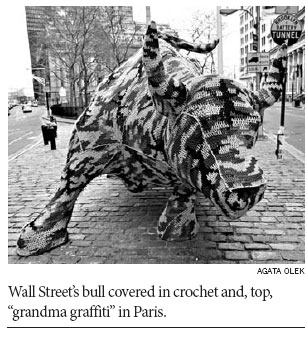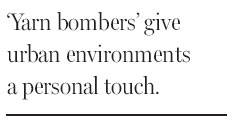Art
A handcrafted, feminine sideof the urban art of graffiti
Updated: 2011-05-29 08:01
By Malia Wollan (New York Times)


The bronze statue of Rocky near the Philadelphia Museum of Art irked Jessie Hemmons. She found the statue too big, too macho and too touristy, so recently Ms. Hemmons, a 24-year-old artist, bombed him. With pinkish yarn.
Using a ladder and a needle, Ms. Hemmons stitched a fuchsia-colored hooded vest on the fictional boxer with the words "Go See the Art" emblazoned across the front, to prod tourists to visit the museum that so many skip after taking their photo with the statue.
She calls the act of artistic vandalism "yarn bombing," adapting a term for plastering an area with graffiti tags.
"Street art and graffiti are usually so male dominated," Ms. Hemmons said. "Yarn bombing is more feminine. It's like graffiti with grandma sweaters."
It is a global phenomenon. In Paris, a culprit has filled sidewalk cracks with knots of yarn. In Denver, a group called Ladies Fancywork Society has crocheted tree trunks, benches and public telephones. In London, Knit the City has "yarnstormed" fountains and fences. In Melbourne, Australia, a woman known as Bali has covered bike racks and bus stops.
Sometimes called grandma graffiti, the movement got a boost, and a manifesto, in 2009 with the publication of the book "Yarn Bombing: The Art of Crochet and Knit Graffiti," by Mandy Moore and Leanne Prain, knitters from Vancouver, Canada.
The book borrows from the vernacular of graffiti and half-jokingly positions yarn bombing as an illicit alternative for knitters bored making yet another sweater.

Ms. Prain said she has been busy since a Canadian declared June 11 International Yarn Bombing Day on Facebook.
Many knitters reached out to Magda Sayeg, a 37-year-old Texan who is considered by many to be the mother of yarn bombing. On a whim in 2005, she knitted a blue-and-pink cover for the door handle of her boutique in Houston.
"People got out of their cars just to come look at it," Ms. Sayeg said of her handiwork.
But not all artists who use yarn in their work are thrilled with the woolly trend.
"I don't yarn bomb, I make art," said Agata Oleksiak, 33, an artist in New York who has been enshrouding humans, bicycles and swimming pools in crochet since 2003. In December, Olek, as she prefers to be called, blanketed the "Charging Bull" statue near Wall Street in pink and purple yarn.
Olek, whose work has been shown in museums and galleries worldwide, considers yarn bombing to be the trite work of amateurs and exhibitionists. "Lots of people have aunts or grandmas who paint," she said. "Do you want to see that work in the galleries? No. The street is an extension of the gallery. Not everyone's work deserves to be in public."
Whether yarn bombing is the work of artists or glorified knitters, the view of law enforcement is clear: it is considered vandalism or littering. Still, the police seem to tolerate it. In the few instances when they are stopped, yarn bombers say, the police are more likely to laugh at them than issue a summons.Ms. Prain once tried to yarn bomb a sign post in Washington, in front of F.B.I. headquarters. A security guard wearing a bulletproof vest approached her, she said, and demanded that she stop immediately. "Ma'am," she recalled him saying, "step away with the knitting."Ms. Sayeg has so much work that she closed her shop in 2009, moved to Austin and turned her hobby into a full-time job. Shew now has five assistants to help her knit. "In the early years I identified with underground graffiti artists," Ms. Sayeg said. "Now the very people I feared I would get in trouble with are the ones inviting me to do this work for them."
The New York Times
Specials

Room at the inn
The Chinese hotel industry experiences a building boom, prompting fears of oversupply.

Pearls of wisdom
Chinese pearl farmers dominate the world market but now want to work smarter, not harder

Truly a super woman
Li Yuchun first came to prominence in 2005 as the Super Girl winner, and since then has become an international star.